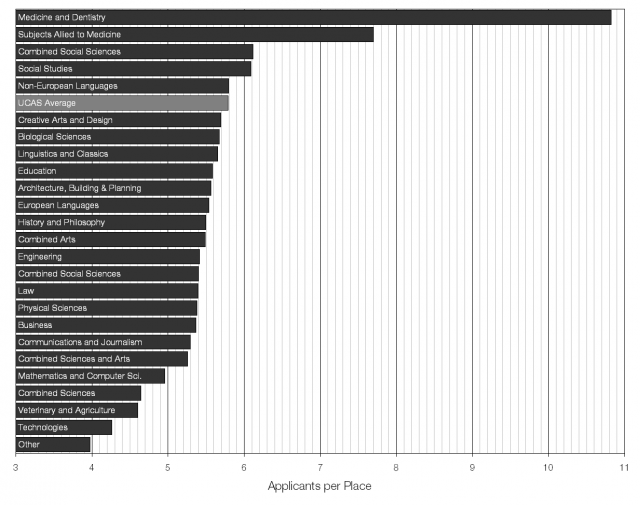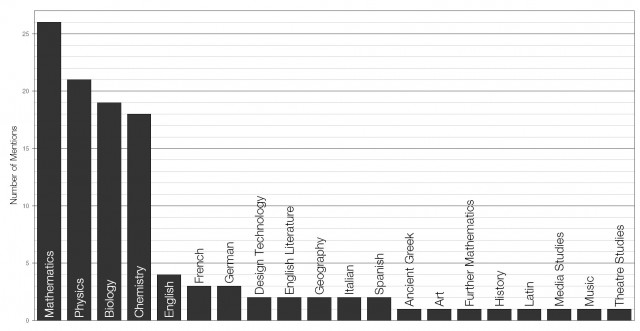Download a copy of these notes suitable for printing (31kB, .PDF).
Over the summer I wrote to forty-one UK physics admissions tutors (thanks to the Institute of Physics’s Physics on Course booklet MyPhysicsCourse website) and asked them what they were looking for in a personal statement. Many replied, both with advice for personal statements and for applications in general, and I have summarised some of this advice below.1 I asked each tutor for permission to reproduce their advice; some preferred that their name and/or affiliation was not used.
Dr George Dobre’s comments were representative of most admissions tutors’ opinions:
“Perhaps what all admissions tutors would like to see in a [personal statement] is what they normally do not offer, namely a quick way to gauge the unique aspects of the applicant … [T]he best type of statement for me is one that isn’t inspired by IdentiKit models and instead concentrates on small things that the applicants have done and enjoyed during the study of physics, something that can be further explored in an interview for example.”
Dr George Dobre, University of Kent
And Professor Fred Loebinger offered a useful guideline:
“[T]he most important aspect of a student’s UCAS form is the indication of a high level of academic achievement/potential.”
Prof. Fred Loebinger, University of Manchester
There was a general feeling that for all but the most competitive courses, the personal statement was not of great importance.
“Personal statements do not matter that much. Applicants … really shouldn’t stress out over them.”
Dr Kathy Romer, University of Sussex
It was made quite clear that the focus was on grades, both predicted and actual.
“I can’t speak for other Universities but for [REDACTED] we are less interested in the personal statement than in the grades and predicted grades.”
Anonymous (SA)
“[T]he first things we tend to look at are grades and predicted grades.”
Anonymous (LR)
“In an application the primary thing for us is the obtained and predicted grades, physics and maths are particularly important.”
Anonymous (AS)
“[T]he personal statement is secondary to the predicted grades. Our offer … is the main criterion by which we judge applicants.”
a University of London admissions tutor
However, there were undoubtedly cases where the personal statement was important.
“[P]ersonal statements tend to be rather homogenous and bland. I tend to downplay their significance and we rely more on interviews, but we still read them for important bits of information such as health related statements.”
Anonymous (OM)
“Personal statements and interview performance are, of course, most important to borderline cases … [A]ll personal statements and school/college references are read to ensure that we don’t miss any mitigating circumstances or unconventional cases (e.g. mature students, disabilities, personal circumstances, non-standard qualifications, illness etc).”
Anonymous (ZH)
“The Statement is used … in cases where the student might marginally have missed the terms of the conditional offer.”
Prof. Fred Loebinger, University of Manchester
There was a desire amongst admissions tutors for more interesting personal statements.
“Last year I read 500 UCAS application forms and they all start to sound the same after while. So anything that makes the candidate stand out from the crowd would be useful.”
Anonymous (HB)
But caution is essential:
“The first priority should be for students to prepare a good, solid statement (even if it is a little bland). It is very difficult to write a personal statement that stands out as being exceptionally good (I would say one in a thousand at most), but it is much easier to write a bad one through carelessness or trying to be too clever.”
Dr Joel Goldstein
Many universities use the personal statement primarily as a starting point for interview questions.
“It is very probable that the interviewer would start off with questions based on the student’s Personal Statement.”
Prof. Fred Loebinger, University of Manchester
“[I]f an applicant is invited for interview, part of the questioning will almost certainly be triggered off the personal statement so applicants must be able to talk about what they have written. Not being able to answer a question about a book claimed to have been read does not look good.”
Dr Robert Forsyth, Imperial College London
“The most significant thing I look for in the UCAS form are the predicted grades, for the personal statement it depends. The major use it has is when we talk to students individually at UCAS day and when evaluating students with marginal grades.”
Admissions Tutor, University of Liverpool
Students should ensure that their personal statement explains the reasoning behind their choice of course.
“[We want to see] evidence that the student has thought hard about the course they are intending to start and have researched their university choices. For instance if choosing Theoretical or Medical Physics, explain why. Does it link to career aspirations or just for interest’s sake? It’s good to see that students appreciate that a Physics degree will be hard work, require a strong interest in the subject and a good mathematical ability but that the future career opportunities are many and varied.”
Dr Carole Tucker, Cardiff University
An interest in physics both within and beyond lessons is important, but students must be careful not to overdo it.
“Evidence that they have taken part in activities in or outside school which demonstrates a real love for the subject goes down well … Something that looks honest, down-to-earth, but which shows a genuine affection for the subject is what impresses most. Anything too studiedly ‘clever’ or which purports to show the student already half way to a Nobel Prize (unless their marks support that!) are treated with caution. Evidence that they have taken part in activities in or outside school which demonstrates a real love for the subject go down well.”
a University of London admissions tutor
“An interest in physics which is best supported by summer placements in science/physics related industries. There is no bigger turn-off than ‘I have been interested in Physics since reading the work of Einstein on relativity etc., or similar’ which we get so often. If … applicants want to say they are interested in physics get them to use examples that are relevant to the syllabus they are studying.”
Anonymous (ML)
Mentioning outside interests is key:
“We are generally looking for a broad range of interests within, but also outside the scientific sphere. These can obviously include sport, music, Duke of Edinburgh Awards etc.”
Prof. Fred Loebinger, University of Manchester
“It is worth listing other achievements, for example playing an instrument or participating in some substantial external activity. If we have to decide between two otherwise equally balanced candidates … then we would use this as evidence of superior time management.”
Anonymous (QM)
“Do mention any part time work or school work experience (even if not related to physics), since it demonstrates maturity. Do mention briefly hobbies – can be done in one sentence as a list … if any of [the student’s] hobbies are at an advanced level, then mention that (e.g. being in a school/county team; being grade 8 in music; being DoE silver/gold); this demonstrates dedication, maturity and often team work. Discussing charity and voluntary work is good and/or leadership activities – demonstrates maturity.”
Dr Kathy Romer, University of Sussex
If students are going to mention their reading, it would seem prudent to avoid any mention of Stephen Hawking’s A Brief History of Time.
“The ‘dull’ applicant will cite … additional reading – usually of some popular physics books (by Stephen Hawking, Brian Greene, Michio Kaku …) and magazines (New Scientist). This becomes awfully repetitive and, upon further questioning, one is left believing that the additional reading is somewhat of a fabrication (most professional physicists never got to the end of A Brief History of Time!).”
Dr Carole Tucker, University of Cardiff
“[Y]ou won’t believe the number of students who claim to have read A Brief History of Time for example.”
Dr Matt Probert
“[W]e more or less filter out, for example, the reading list (inevitably including A Brief History of Time) unless it contains something outstanding, such as regularly reading research papers.
Anonymous (QM)
“It is often obvious that [personal statements] are the product of an internet search, for example, when they include the reading of Hawking’s A Brief History of Time.”
Anonymous (OM)
Admissions tutors also had advice for teachers and for school references:
“Mention if candidate has a high position in the class, or compares very well to candidates in previous years [and] list any substantial academic distinctions, such as school or external prizes, gold or silver medals in UK Maths Tournaments, etc.”
Anonymous (QM)
“The referee statement is most helpful when it gives some idea of the expected grades and of any special position that the applicant holds in School (or outside if this is known to the referee). Often we see a statement that merely repeats the candidate’s own statement, which whilst it validates the claims, is not additive.”
Anonymous (IW)
1 Not everyone agreed that this was a good idea. One admissions tutor wrote: “I think that greatest attribute of a personal statement is that it shows the individuality of the student and not just the ‘recipe’ proposed by the school. So in many ways, if I were to give you a ‘recipe’ for a physics student it would be counterproductive.”
 (Note that the scale starts at three applicants per place, not at zero.)
(Note that the scale starts at three applicants per place, not at zero.)